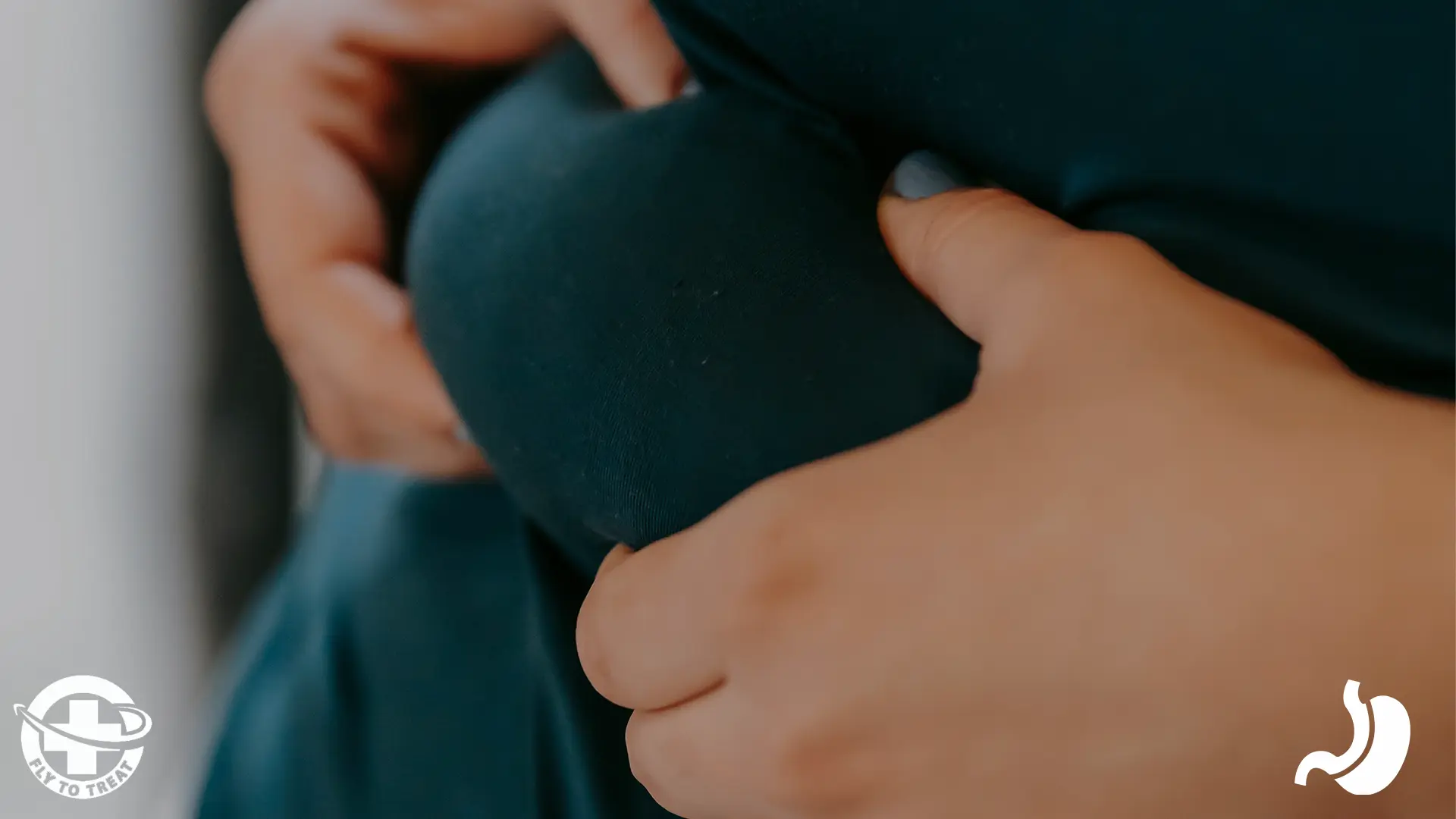
Bypass or sleeve which to choose?
When searching for weight loss surgery options, knowing the differences between gastric bypass vs sleeve procedures is important. At FlyToTreat, we aim to provide comprehensive information to help you make informed decisions. This article addresses common questions such as "Is the gastric sleeve safer than bypass?" and "What is the difference between gastric bypass and gastric sleeve?" By comparing these surgeries, we offer insights into their risks, benefits, and recovery times, helping you choose the safest and most effective weight-loss surgery.
Sleeve gastrectomy and gastric bypass
Sleeve gastrectomy and gastric bypass are two popular bariatric surgeries designed to aid in significant weight loss. Understanding the differences between these procedures can help individuals choose the right option for their needs.
• Sleeve gastrectomy involves removing about 80% of the stomach, leaving a tube-shaped stomach about the size and shape of a banana. This smaller stomach limits the amount of food you can eat and helps you feel full sooner.
• Gastric bypass involves assembling a small pouch from the stomach and linking it to the small intestine directly. This not only reduces stomach size but also alters the digestive process by rerouting the small intestine, leading to reduced calorie absorption.
Both surgeries are effective for weight loss, but they have distinct differences. Gastric bypass often results in more significant weight loss compared to sleeve gastrectomy but comes with a higher risk of complications. It's important to consult with a healthcare provider to determine the best option between gastric sleeve vs bypass based on individual health needs and weight loss goals.
Understanding these differences helps clarify the choice between gastric sleeve vs gastric bypass for those considering bariatric surgery.
Here you can see who is a good candidate for gastric sleeve surgery?
Sleeve gastrectomy revision to gastric bypass
Sleeve gastrectomy revision to gastric bypass is an option for patients who have not achieved their desired weight loss or have developed complications after a sleeve gastrectomy. This procedure involves converting the original sleeve gastrectomy into a gastric bypass. The conversion can improve weight loss results and address issues like acid reflux. Patients considering this option should consult with their healthcare provider to discuss the benefits and risks, as well as how it compares to other procedures like
Gastric sleeve after gastric bypass
Gastric sleeve after gastric bypass is a solution for individuals who haven't achieved enough weight loss post-bypass. The procedure involves converting the bypass to a sleeve gastrectomy, reducing stomach size and enhancing weight loss. Patients should consult their surgeon to understand the potential benefits and risks, and compare with options like gastric sleeve vs gastric bypass or sleeve gastrectomy revision to gastric bypass.
gastric bypass after sleeve
Gastric bypass after sleeve gastrectomy is an option for individuals who have regained weight or experienced complications after their initial surgery. This conversion can be beneficial for enhancing weight loss results and addressing issues that may arise from the sleeve procedure. By converting to a gastric bypass, patients may see improved outcomes, particularly if they have not achieved their desired weight loss with the sleeve alone. This decision should be made in consultation with a healthcare provider to ensure the best approach for each individual's needs.
In the context of gastric bypass vs sleeve, this revision aims to offer better weight management and resolution of complications, highlighting the benefits of gastric sleeve vs gastric bypass.
What is the difference between gastric bypass and gastric sleeve?
Understanding the difference between gastric bypass vs sleeve gastrectomy is crucial for those considering weight loss surgery. Gastric sleeve surgery involves the removal of a large portion of the stomach, resulting in a smaller, sleeve-shaped stomach that limits food intake and reduces hunger hormones. In contrast, gastric bypass surgery not only reduces the stomach size but also reroutes the small intestine, which alters how the body absorbs calories and nutrients.
The primary distinction lies in their mechanisms: while the gastric sleeve focuses on restriction by making the stomach smaller, the gastric bypass combines restriction with malabsorption by changing the digestive tract's pathway. Each procedure has its benefits and risks, and the choice between them should be based on individual health conditions, weight loss goals, and professional medical advice. Patients often consider factors like the potential for more significant weight loss and resolution of comorbidities when deciding between gastric sleeve vs bypass options.
dietary changes after sleeve surgery and bypass
Dietary changes after gastric bypass vs sleeve surgeries are essential for successful recovery and long-term weight loss. Post-surgery, patients must focus on consuming nutrient-dense foods while avoiding processed items. Initially, a liquid diet is recommended, gradually transitioning to soft and then solid foods. It's crucial to eat small, frequent meals to prevent overloading the smaller stomach. Protein intake should be prioritized to maintain muscle mass, and hydration is vital. Avoiding high-sugar, high-fat foods helps in sustaining weight loss and preventing complications. See The Essential Guide to Gastric Sleeve Diet Success to learn more.
What is the difference between the size of the stomach in these surgeries?
The size of the stomach differs impressively in gastric bypass vs sleeve surgeries. In a gastric sleeve procedure, about 80% of the stomach is removed, leaving a small, banana-shaped stomach. This limits the quantity of food that can be eaten.In contrast, gastric bypass involves creating a small pouch at the top of the stomach and connecting it directly to the small intestine, bypassing most of the stomach and a portion of the intestines. This results in a significantly smaller stomach capacity compared to the gastric sleeve vs gastric bypass.
What’s the difference between the cost of a gastric sleeve and gastric bypass surgery?
The cost difference between gastric bypass vs sleeve surgeries is notable. Generally, gastric sleeve cost tends to be less expensive, costing about 25% less than gastric bypass surgery. While prices vary depending on the provider and location, gastric sleeve vs bypass surgeries both have significant financial implications. Gastric sleeve vs gastric bypass costs can also differ due to the complexity of the procedures, with gastric bypass typically being more involved. This makes gastric bypass vs gastric sleeve a key consideration for patients planning their weight loss journey.
nutrient absorption in gastric sleeve vs bypass
The difference in nutrient absorption between gastric bypass vs sleeve surgeries is significant. Gastric bypass surgery alters the digestive system more extensively, leading to reduced absorption of nutrients due to the rerouting of the small intestine. In contrast, gastric sleeve vs bypass involves removing a portion of the stomach but does not significantly impact nutrient absorption. However, both surgeries require patients to monitor their nutrient intake closely to prevent deficiencies. This distinction makes gastric sleeve vs gastric bypass crucial when considering long-term nutritional health.
health conditions Associated with Gastric sleeve vs bypass
Health conditions associated with gastric sleeve vs bypass surgeries differ in some aspects. Gastric bypass is generally more invasive and can lead to greater weight loss, often recommended for patients with severe obesity-related conditions like type 2 diabetes. Conversely, gastric sleeve vs gastric bypass offers fewer complications and is often chosen for those who want a less invasive option. Both surgeries, however, necessitate significant lifestyle changes, including diet modifications to avoid high-fat and high-sugar foods, crucial for maintaining health post-surgery.
The recovery times after gastric bypass vs gastric sleeve
Recovery times after gastric sleeve vs bypass surgeries can vary. Typically, patients undergoing gastric bypass might expect a hospital stay of two to three days, followed by several weeks of recovery at home. Conversely, recovery from a gastric sleeve procedure is often quicker, with a shorter hospital stay and a slightly faster return to normal activities. Despite the differences, both procedures necessitate careful post-operative care and adherence to dietary guidelines to ensure successful recovery and weight loss.
Can you eat more with a gastric bypass or gastric sleeve?
When comparing gastric bypass vs sleeve surgeries, the amount of food you can consume differs. Gastric sleeve surgery reduces the stomach to about 15% of its original size, significantly limiting food intake. Gastric bypass also reduces stomach size but involves rerouting the small intestine, which affects how food is absorbed. Generally, patients with a gastric sleeve might be able to eat slightly more than those with a gastric bypass, but both procedures impose strict limitations to achieve weight loss goals effectively. For a comprehensive guide for gastric sleeve diet, check this link
What is the safest weight-loss surgery?
Wondering what is the safest weight-loss surgery? When considering gastric bypass vs sleeve for weight-loss surgery, sleeve gastrectomy is often regarded as the safest option. It involves removing about 80% of the stomach, leading to fewer complications and a quicker recovery compared to more invasive surgeries. According to Healthline, it has a lower risk profile and fewer long-term nutritional deficiencies than gastric bypass. Thus, for those weighing their options between gastric sleeve vs gastric bypass, sleeve gastrectomy is frequently recommended for its safety and effectiveness.
conclusion
In conclusion, choosing between a gastric sleeve vs gastric bypass requires careful consideration of various factors, including health conditions, cost, recovery time, and dietary changes. Both procedures have distinct advantages and potential risks, and the best choice depends on individual health needs and weight loss goals. At FlyToTreat, we strive to guide you through these options, ensuring you make a well-informed decision that aligns with your long-term health and wellness objectives.
04 August 2024 - Updated At: 04 August 2024
Comment




